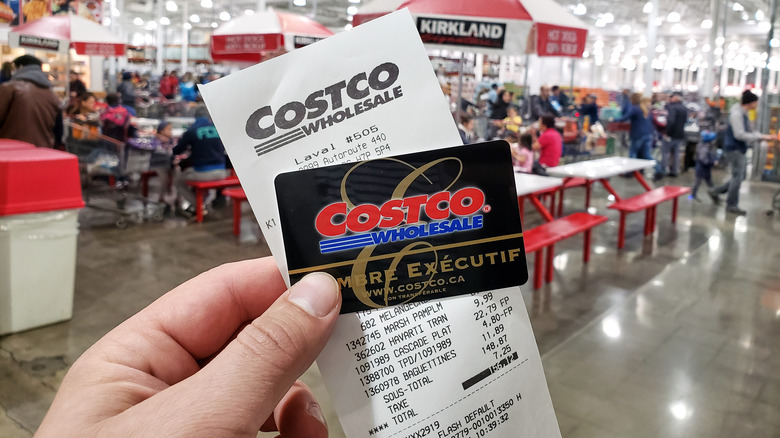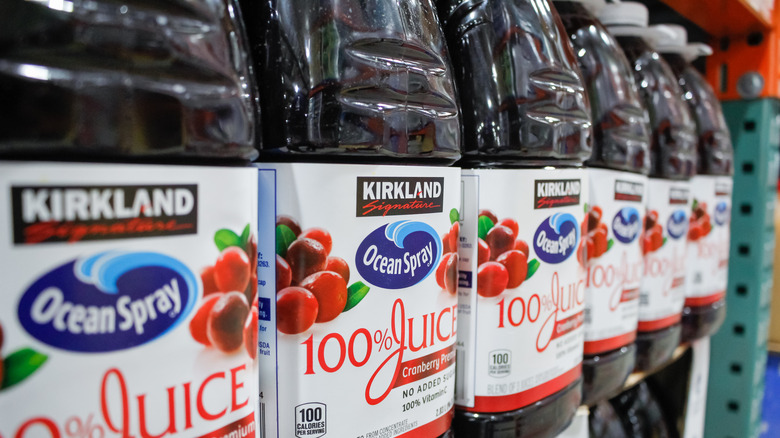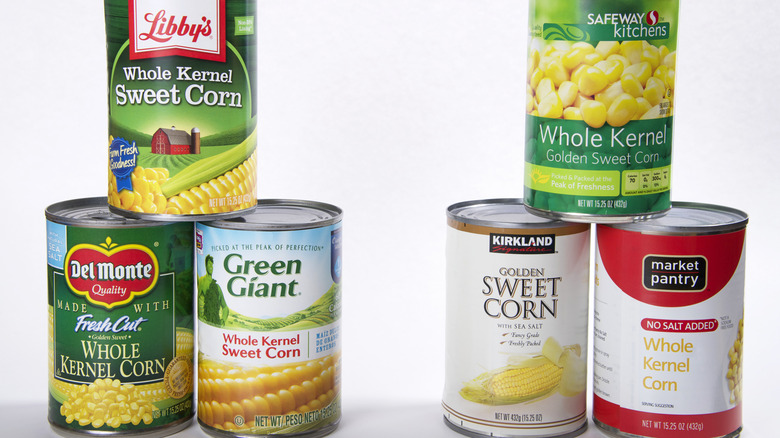What Is 'White-Labeling' At Costco And How Does It Affect Your Wallet?
Costco is all about bargains, from the massive tubs of peanut butter pretzels to the legendary $4.99 rotisserie chickens. More bang for your buck is the name of the game, and the compelling marriage of bulk volume and low price tags has turned Costco into the third-largest retailer in the world, trailing only Walmart and Amazon. Buying in bulk isn't always a good idea, mainly when you're buying perishable items like produce and meat, but it is the perfect model for a task such as filling your pantry or stocking up on essential home goods like tissue paper and batteries.
The only downside of doing this at Costco is that the wholesaler offers a much narrower selection to choose from. Whereas most supermarkets carry multiple brands of each product, Costco usually offers its own private-label brand, Kirkland. Even though brand loyalty is declining as more shoppers are prioritizing thrift, some may feel that they have to give up a particular product they've favored for years. But that's not really the case. We think of house brands like Kirkland as alternatives to name brands, but in reality, they are often the exact same product. The only difference is the packaging, a practice known as 'white-labeling.'
White label products are familiar brands in disguise
Products sold under house brands like Kirkland aren't actually manufactured by their respective retailers. Instead, third-party manufacturers produce these items in bulk and sell them to multiple retailers, each of which puts its own brand name on the packaging. This is called 'white-labeling.' It means that multiple retailers are selling you the exact same product while giving the impression that they are different. From the consumer perspective, white-labeling is a clearly deceptive practice, but for retailers and manufacturers, it's just smart business.
Retailers would be hard pressed to produce all of their own goods in-house, especially a store like Costco that covers such a wide array of products. Can you really expect them to manufacture laundry soap, vitamin supplements, and oven-ready meals all with equal aptitude? It's much more efficient and reliable for Costco to contract specialized manufacturers to provide each product. White-labeling also increases the profit margins for retailers, who can create long-term, bulk-order contracts. Selling to bulk buyers on a contract basis also benefits manufacturers by guaranteeing a certain amount of revenue.
Costco is far from the only company to sell white label products. Any major retailer with a house brand is doing the exact same thing. Trader Joe's is perhaps the most notable example, given that nearly all the products they carry are sold under their own name. Other significant examples include Whole Foods' 365, Walmart's Great Value, Kroger's Simple Truth, and Amazon Basics.
The real brands behind white labels
The obvious question to ask here is: If retailers aren't making the products that carry their brand names, who is? For the most part, white-label goods are made by the same big-name companies that consumers think they are passing up when they buy house brand products. At first, this might seem senseless on the part of the manufacturer. Are they not fueling their own competition here? Yes and no. They may drive business away from their name brand, but since they also make the house brands, it's not really considered competition. Though house brands typically sell for far less than name brands, the manufacturers often have no better option. As customers have shifted their shopping habits from brand loyalty to bargain-hunting, retailers have gained an advantage over producers.
It can be difficult to find out which manufacturers are supplying stores like Costco since both parties tend to keep these deals secret. Costco executives have revealed a few sources: For example, Kirkland batteries are made by Duracell. You can sometimes determine which brands are being sold under white labels by tracking product recalls. When Dole issued a recall on lettuce in 2021, Walmart did the same, revealing that Dole was supplying their fresh salads. It would be nice to see more transparency from these brands, but ultimately, white-label products are a boon to customers, who can get the exact same products at a lower price simply by changing which store they go to.


